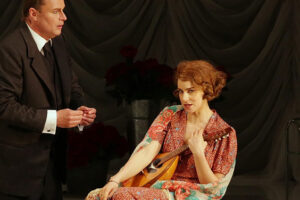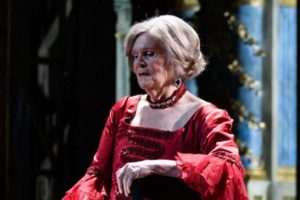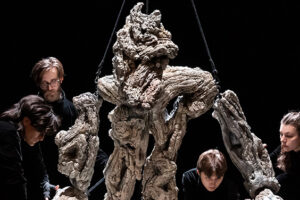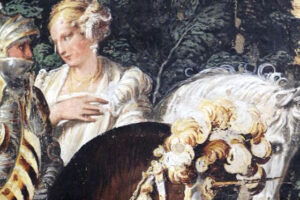

One of the most celebrated composers of early Baroque Opera, he’s mostly been forgotten today. Out of his thirty-five operas, only La Calisto is performed with any kind of regularity.
De Nederlandse Opera’s new video release of Ercole Amante is in fact only the second recording the work has ever received (a long out-of-print CD conducted by Michel Corboz was the first). Thankfully, this is an excellent (if bizarre) production of the opera, as well done as we’re ever likely to see it.
Composed for the occasion of the marriage of Louis XIV of France, (there is a lengthy prologue paying tribute to this glorious monarch), Ercole is one of those strange operas where there is so much going on that the action is more confusing than a Lars van Tier film. Boiled down to its most basic elements, the plot concerns the great hero Ercole (Hercules), who is in love with the captive princess Iole. There are two major problems therein: firstly, she’s in love with his son Hyllo, and, secondly, Ercole is already married.
After the usual “she’s betrayed me, no she hasn’t” and “he’s dead, no he’s not, yes he is, actually no he’s not” entanglements common to the era, Ercole is accidentally killed via a poisoned robe by his betrayed wife Deianira and packed off to Heaven, where, because he is a great hero if not a particularly nice guy, he gets to marry the goddess Bellezza. On top of all that, throw in ever clichéd devise of Operas Buffo and Seria that you can think of. Warring goddesses? Check. Cheeky servants? Check. Magic spells? Check. A visit to the underworld for the usual vengeful ghosts? Check. A storm at sea which ends with a countertenor getting eaten by a fish? Check and double check.
With so much to deal with, it’s little surprise that David Alden’s production fails to make much sense of the proceedings. While never quite as radical as his twin brother Christopher’s, Alden’s productions have always have resulted in a good amount of head scratching, in a word: the “huh?!” factor. Since Ercole has the “huh?!” factor build in, it’s a perfect vehicle for Alden’s insanity, and he plays up the ridiculousness. This is a world where anguished queens in 17th century finery stand next to servants dressed as 70s-style pimps, where dignified, ethereal goddesses suddenly break out into Bollywood dance moves, and of course, the obligatory squadron of giant dancing babies. The madness onstage shouldn’t work as well as it does, but even if it’s not very cohesive it’s certainly entertaining.
Alden’s fine cast is up to the challenge of whatever he throws at him. Luca Pisaroni, in the title role, is most challenged: when Ercole first appears, feeling lovesick and down in the dumps, he is shown to be a perfectly normal man, but over the course of his first scene, he puts on a costume consisting of a plastic muscle suit, platform shoes and a long blond wig, in a look apparently modeled after Dog the Bounty Hunter. Pisaroni spends the rest of the opera stomping around onstage in this constricting garb, and not only pulls it off with flair but also brings a lyrical, darkly-hued baritone to the bullying title character. His death scene is a fearless example of commitment, as Pisaroni lurches and crawls about the stage smearing himself with blood and singing an endless monologue of anguish before finally keeling over. Magnificent: I suspect he would be an excellent Don Giovanni.
He is backed up by an exquisite supporting cast, which includes Baroque specialists like Umberto Chiummo, Mark Tucker and Johannette Zomer, all of who do excellent double duty in a series of cameo roles. Veronica Canegmi suffers an unflattering make-up job but uses her light soprano exquisitely as Iole. Likewise Jeremy Ovenden is shoved into a costume making him look like an obese 12-year-old, but sings ravishing as Hyllo.
Anna Maria Panzarelli is the excellent Deianira, the distant ancestor of Countess Almaviva. Mezzos Anna Bonitatibus and Wilke te Brummelstroete deserve their divinity as Venere (Venus) and Giunone (Juno), who respectively aid and foil Ercole at every turn. Bonitatibus is especially noteworthy, her darkly colored voice highlighting the danger lurking behind every word the goddess utters. Marlin Miller is fussy and indistinct as the comic servant Licco, but countertenor Tim Mead is so funny his sidekick the Page that it makes one wish he doesn’t get killed off halfway through the opera. (He’s the aforementioned fish food.)
Since there are several ballets written into the opera (composed by the French King’s court composer Lully rather than Cavalli), the dancers in this opera are nearly as important as the singers. The choreography of Jonathan Lunn and the fine dancers, who are asked to perform everything from 17th century court dances to acrobatic flips to Mark Morris-style modernism, are definitely worth a mention. Also notable are the effective sets of Paul Steinberg and the endlessly inventive costumes of Constance Hoffmann. The Nederlandse Opera Chorus and the Concerto Köln also provide generally fine work, led by the expert baton work of Baroque specialist Ivor Bolton.
More good news in is the packaging. Opus Arte usually has excellent presentational skills, and this is no exception. The menus, picture and sound are all beautiful. There’s also, as I’ve come to expect from Opus Arte, several interesting bonus features, including a half-hour behind the scene feature, which features plenty of rehearsal footage and interviews with many of the singers, Alden and several members of the production team.
Also included are two documentary “meet the singer” profiles on Zimmer and Pisaroni, who comes off as a charmingly affable fellow unafraid of playing with his dog in the rain on the day of a performance (a refreshing change from the hypochondria that most singers, myself included, seem to fall into.) These bonus features are the cherry on top of the sundae; combine them with the strength of the performers, the bizarre wit of the production and the rarity of the opera to make a guaranteed recommendation.

























Comments